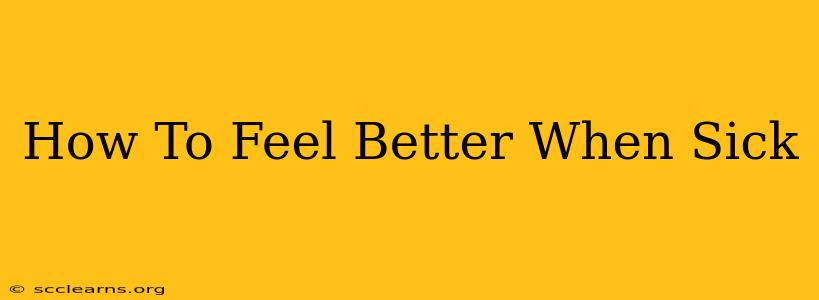Feeling under the weather? Nobody enjoys being sick, but knowing how to ease your symptoms and support your body's natural healing process can make a world of difference. This guide offers practical tips and strategies to help you feel better when you're sick, whether you're battling a cold, the flu, or something else entirely.
Understanding Your Symptoms
Before diving into remedies, it's crucial to understand the nature of your illness. Are you experiencing a stuffy nose, sore throat, cough, fever, body aches, or nausea? Identifying your primary symptoms will help you target your relief efforts more effectively. While this guide offers general advice, always consult a doctor if your symptoms are severe or persist for an extended period.
Essential Strategies for Feeling Better Faster
1. Rest is Paramount
This might seem obvious, but rest is your body's best friend when fighting illness. Your immune system needs energy to combat infection, and sleep allows your body to repair and rebuild. Aim for 8-10 hours of quality sleep each night. Even short rest periods throughout the day can be beneficial.
2. Hydration is Key
Dehydration weakens your immune system and exacerbates symptoms. Drink plenty of fluids, including water, clear broths, and electrolyte drinks, to stay hydrated. Avoid sugary drinks, as they can worsen some symptoms.
3. Nourishing Foods for Recovery
While you might not feel like eating, providing your body with nutrients is essential. Opt for easily digestible foods like soups, broths, and soft fruits. These provide essential vitamins and minerals without taxing your digestive system. Avoid heavy, greasy, or spicy foods.
4. Over-the-Counter Medications
Many over-the-counter medications can help alleviate specific symptoms:
- Pain relievers (acetaminophen or ibuprofen): Reduce fever and ease aches and pains. Always follow dosage instructions carefully.
- Decongestants: Can help relieve nasal congestion.
- Cough suppressants: Can help reduce coughing, especially at night.
- Sore throat lozenges or sprays: Soothe a sore throat.
Note: Consult a pharmacist or doctor before taking any medications, especially if you have pre-existing health conditions or are taking other medications.
5. Soothing Home Remedies
Several home remedies can provide comfort and support your recovery:
- Gargle with salt water: Soothes a sore throat.
- Use a humidifier or steam: Moistens dry air and can relieve nasal congestion.
- Apply warm compresses: Soothes aches and pains.
- Drink warm liquids like tea or honey lemon water: Soothes a sore throat and provides hydration.
When to Seek Professional Medical Attention
While home remedies and self-care are often sufficient, it's crucial to seek medical attention if you experience:
- High fever (over 103°F or 39.4°C)
- Severe or persistent headache
- Difficulty breathing
- Chest pain
- Severe vomiting or diarrhea
- Symptoms lasting longer than a week
Your health is paramount. Don't hesitate to seek medical attention if you have any concerns.
Preventing Future Illness
Proactive steps can reduce your chances of getting sick:
- Get enough sleep: A well-rested body is better equipped to fight off infections.
- Eat a healthy diet: A balanced diet boosts your immune system.
- Wash your hands frequently: This is one of the most effective ways to prevent the spread of germs.
- Avoid close contact with sick individuals: Limit your exposure to contagious illnesses.
- Get vaccinated: Flu shots and other vaccines can protect you from preventable illnesses.
By following these tips and prioritizing self-care, you can significantly improve your chances of feeling better faster when you're sick. Remember, listening to your body and seeking professional advice when needed are essential for a speedy and complete recovery.

